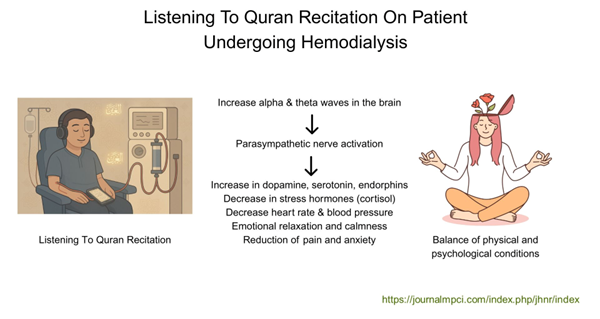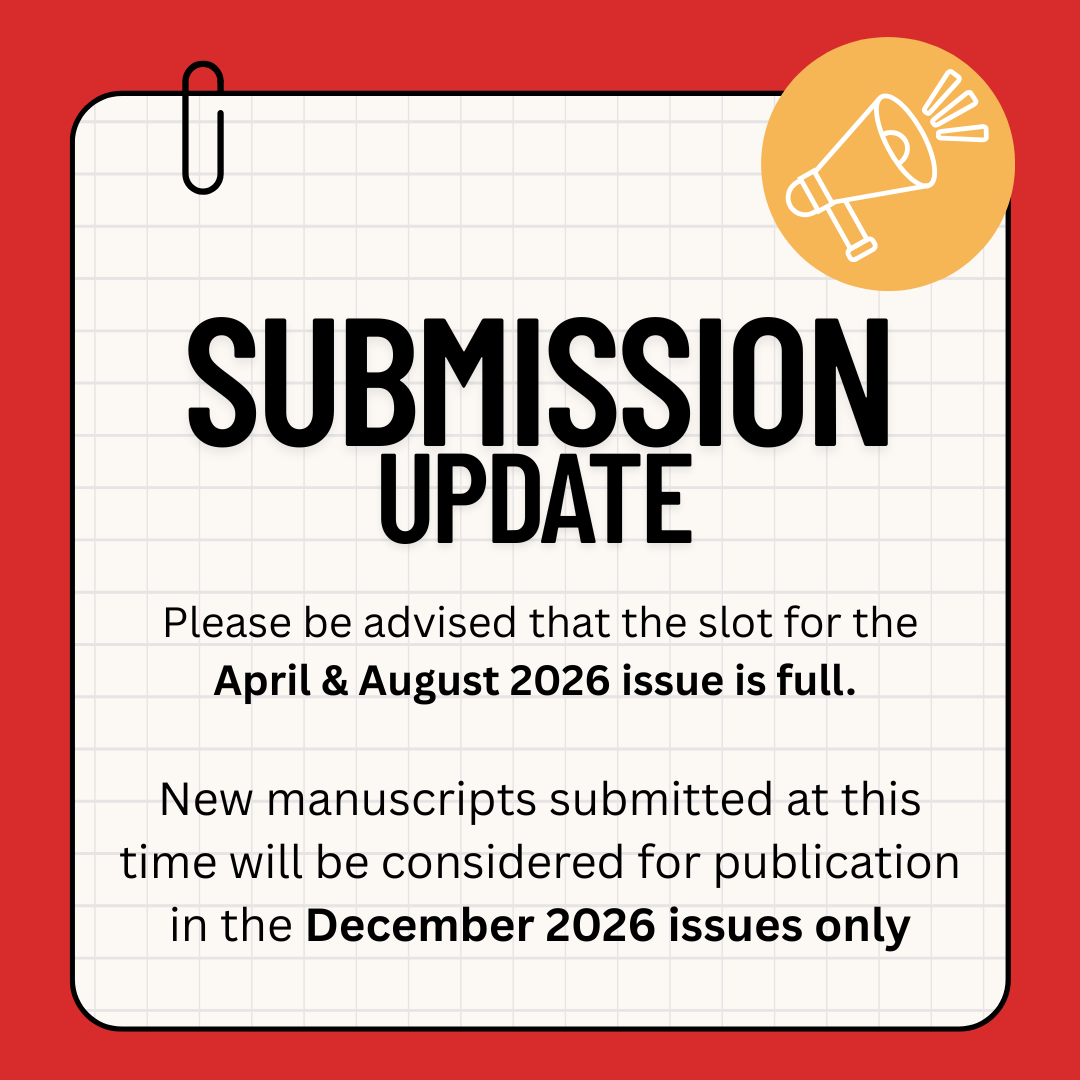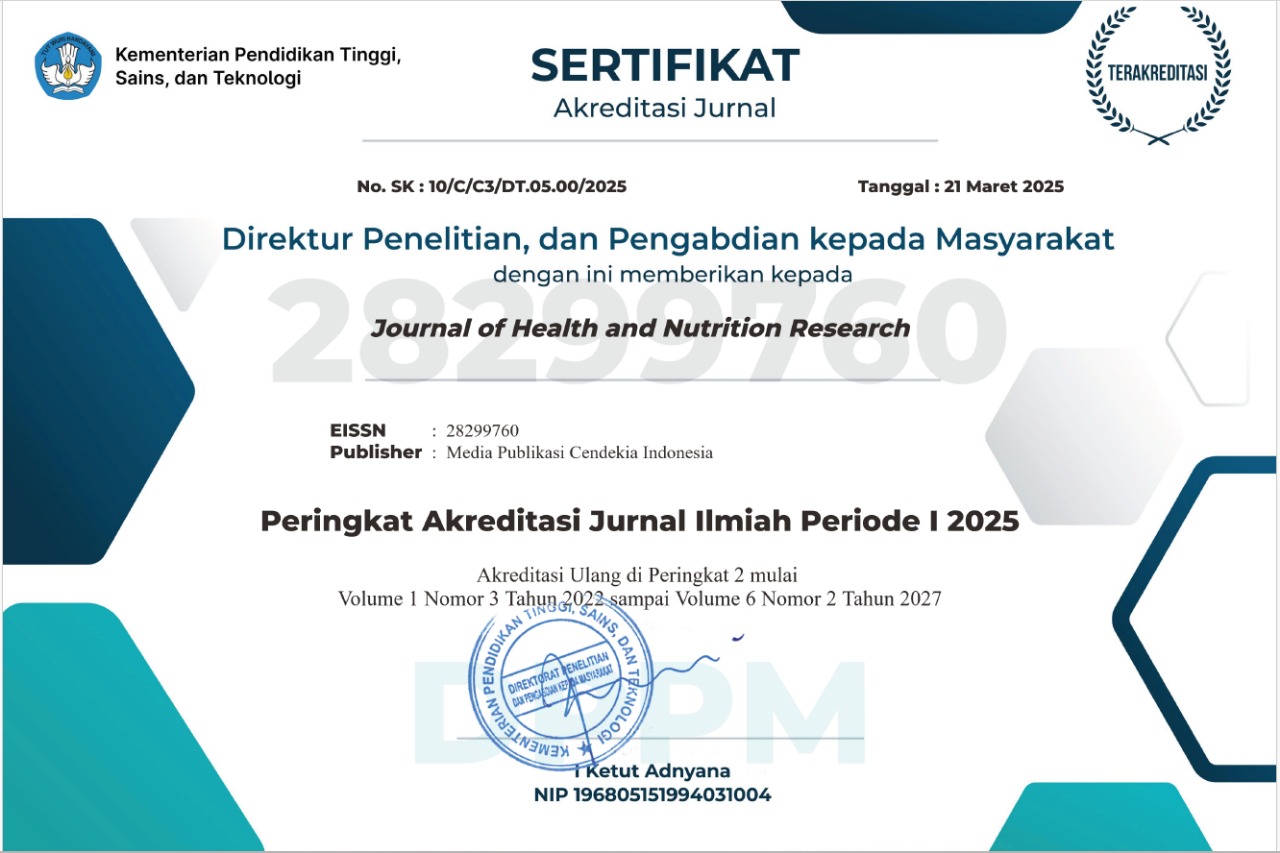The Effects of Listening to Quran Recitation on Patients Undergoing Hemodialysis: A Scoping Review
Keywords:
Chronic Kidney Disease, Hemodialysis, QuranAbstract
Hemodialysis (HD) is part of the therapy for chronic kidney disease (CKD) patients to partially replace kidney function. However, the routine process of hemodialysis, which is performed two to three times a week, has an impact to patient’s quality of life. Spiritual-based interventions, such as listening to Quran recitation, are emerging as a complementary-therapies to address the symtomps experienced by patients undergoing hemodialysis. However, the potential use of listening to the quran in patients undergoing hemodialysis remains limited. Therefore, this study aims to explore and assess the effects of listening to Quran recitation in CKD patients undergoing hemodialysis. The scoping review was used in this study. The eligibility criteria of this study, include all full-text primary studies written in English and published between 2015 and 2024. The literature systematically searched using 3 databases, such as PubMed, Scopus, and EbscoHost with keywords "chronic kidney disease AND listening quran OR listening koran AND hemodialysis.” Additionally, search engine, Google Scholar, also used to identify additional literature. A total of 9 articles were included consisting of 3 RCTs and 6 quasi experimental studies. The effects of listening to Quran recitation were divided into two benefit cluster. 1) Psychological benefits, such as reduced anxiety, lower depression, and improved quality of life. 2) Physical benefits, such as improved physical condition and reduced fatigue, lower blood pressure, and reduced systemic inflammation. The findings suggest that Quran recitation can be a valuable, non-invasive adjunctive therapy to support holistic care models for CKD patients undergoing hemodialysis.
Downloads
References
Jadoul M, Aoun M, Masimango Imani M. The major global burden of chronic kidney disease. Lancet Glob Heal [Internet]. 2024 Mar 1;12(3):e342–3. Available from: https://doi.org/10.1016/S2214-109X(24)00050-0
Qin K, Qing J, Wang Q, Li Y. Epidemiological shifts in chronic kidney disease: a 30-year global and regional assessment. BMC Public Health [Internet]. 2024;24(1):3519. Available from: https://doi.org/10.1186/s12889-024-21065-9
Guo J, Liu Z, Wang P, Wu H, Fan K, Jin J, et al. Global, regional, and national burden of chronic kidney disease, 1990–2017: a systematic analysis for the Global Burden of Disease Study 2017. Lancet [Internet]. 2020;(January). Available from: https://www.sciencedirect.com/science/article/pii/S0140673620300453
Shouket H. Psychological Interventions for End-Stage Renal Disease Patients’ Receiving Hemodialysis. In: Wu HHL, editor. Rijeka: IntechOpen; 2024. Available from: https://doi.org/10.5772/intechopen.112793
Nataatmadja M, Evangelidis N, Manera KE, Cho Y, Johnson DW, Craig JC, et al. Perspectives on mental health among patients receiving dialysis. Nephrol Dial Transplant Off Publ Eur Dial Transpl Assoc - Eur Ren Assoc. 2020 Dec;
Almutary H. Psychosocial Aspects in Hemodialysis. In: Karkar A, editor. Rijeka: IntechOpen; 2023. Available from: https://doi.org/10.5772/intechopen.109592
Oke E, Yasemin Kutlu F, Professor R. Hopelessness, anxiety, depression and treatment adherence in chronic hemodialysis patients. Int J Caring Sci [Internet]. 2019;12(1):423–8. Available from: www.internationaljournalofcaringsciences.org
Babamohamadi H, Sotodehasl N, Koenig HG, Jahani C, Ghorbani R. The Effect of Holy Qur’an Recitation on Anxiety in Hemodialysis Patients: A Randomized Clinical Trial. J Relig Health. 2015 Oct;54(5):1921–30.
Yadak M, Ansari KA, Qutub H, Al-Otaibi H, Al-Omar O, Al-Onizi N, et al. The Effect of Listening to Holy Quran Recitation on Weaning Patients Receiving Mechanical Ventilation in the Intensive Care Unit: A Pilot Study. J Relig Health. 2019;58(1):64–73.
Ruslan R. TAFSIR PENGOBATAN Wawasan Al-Qur’an tentang Pengobatan. Alauddin University Press; 2015.
Aburuz ME, Othman EH, Al-Dweik G, Momani A, Ahmed FR. The Effect of Holy Quran Audio Therapy on Depression and Anxiety Among Jordanian Patients Following CABG: A Randomized Control Trial. Open Nurs J [Internet]. 2023;17. Available from: https://www.scopus.com/inward/record.uri?eid=2-s2.0-85178917218&doi=10.2174%2F0118744346262682230921094004&partnerID=40&md5=d5ea75953bfad2c5f44042d72af1e7ac
Iryani ES, Ismansyah, Firdaus R. The Effect of Al-Quran Murottal Therapy on Pain and Anxiety Scores in Preoperative Patients in Inpatient Rooms. Formosa J Sci Technol. 2023;2(5):1263–84.
Ghiasi A, Keramat A. The effect of listening to holy quran recitation on anxiety: A systematic review. Iran J Nurs Midwifery Res [Internet]. 2018;23(6):411–20. Available from: https://www.scopus.com/inward/record.uri?eid=2-s2.0-85061922988&doi=10.4103%2Fijnmr.IJNMR_173_17&partnerID=40&md5=33bd7540a47e41314d7ef7b4c61a7f9e
Mirghafourvand M, Sehhati Shafaie F, Mohammad-Alizadeh-Charandabi S, Jabbari B. Effect of Vocalization of the Holy Quran With and Without Translation on Pregnancy Outcomes: A Randomized Clinical Trial. Iran Red Crescent Med J. 2016 Sep;18(9):e35421.
Peterson J, Pearce PF, Ferguson LA, Langford CA. Understanding scoping reviews: Definition, purpose, and process. J Am Assoc Nurse Pract. 2017 Jan;29(1):12–6.
Joanna Briggs Institute (JBI). JBI’s critical appraisal tools [Internet]. Joanna Briggs Institute. 2022 [cited 2025 May 5]. Available from: https://jbi.global/critical-appraisal-tools
Babamohamadi H, Sotodehasl N, Koenig HG, Al Zaben F, Jahani C, Ghorbani R. The Effect of Holy Qur’an Recitation on Depressive Symptoms in Hemodialysis Patients: A Randomized Clinical Trial. J Relig Health. 2017 Feb;56(1):345–54.
Frih B, Mkacher W, Bouzguenda A, Jaafar H, ALkandari SA, Ben Salah Z, et al. Effects of listening to Holy Qur’an recitation and physical training on dialysis efficacy, functional capacity, and psychosocial outcomes in elderly patients undergoing haemodialysis. Libyan J Med. 2017 Dec;12(1):1372032.
Mashitah MW, Lenggono KA. Quran recitation therapy reduces the depression levels of hemodialysis patients. Int J Res Med Sci. 2020;8(6):2222.
Agustiyowati THR, Endah DR, Putri TARK. The Effect of Murottal Al-Quran Therapy on Anxiety Level of Chronic Kidney Disease Patients Undergoing Hemodialysis. J Keperawatan Komprehensif (Comprehensive Nurs Journal). 2022;8(4).
Komariah A, Rochmawati E. The Effect of Listening to the Holy Qur’an and a Back Massage on Fatigue and Quality of Life for Participants Undergoing Hemodialysis: A Quasi-Experimental Study. J Relig Health. 2023 Dec;62(6):4334–46.
Teimourzadeh M, Babamohamadi H, Yarmohamadi M, Ghorbani R, Koenig HG. The Effect of the Holy Quran Recitation on Inflammatory Markers in Hemodialysis Patients in Iran: A Randomized Clinical Trial. J Relig Health. 2024 Dec;63(6):4826–39.
Melastuti E, Nursalam N, Sukartini T, Janitra FE. Combination Therapy: Murottal and Slow Stroke Back Massage (SSBM) Affecting the Blood Pressure of Hemodialysis Patients. Int J Psychosoc Rehabil. 2020;24(7):2020.
Suhita BM, Arini DY. The Effectiveness of Murottal Al-Qur’an Therapy by Surah Ar-Rahman toward Anxiety of Crhonic Kidney Disease (CKD) which is being Hemodialysis at Gambiran Hospital Kediri. Str J Ilm Kesehat. 2019;8(2):129–35.
Rasyid H, Kasim H, Zatalia SR, Sampebuntu J. Quality of Life in Patients with Renal Failure Undergoing Hemodialysis. Acta Med Indones. 2022;54(2):307–13.
Zulkurnaini NA, Kadir RSBSA, Murat ZH, Isa RM. The Comparison between Listening to Al-Quran and Listening to Classical Music on the Brainwave Signal for the Alpha Band. 2012 Third Int Conf Intell Syst Model Simul [Internet]. 2012;181–6. Available from: https://api.semanticscholar.org/CorpusID:16535568
Qolizadeh A, Myaneh ZT, Rashvand F. Investigating the effect of listening to the Holy Quran on the physiological responses of neonates admitted to neonatal intensive care units: A pilot study. Adv Integr Med [Internet]. 2019;6(4):159–62. Available from: https://www.sciencedirect.com/science/article/pii/S2212958817301647
Moulaei K, Haghdoost A-A, Bahaadinbeigy K, Dinari F. The effect of the holy Quran recitation and listening on anxiety, stress, and depression: A scoping review on outcomes. Heal Sci Reports [Internet]. 2023;6(12). Available from: https://www.scopus.com/inward/record.uri?eid=2-s2.0-85178880846&doi=10.1002%2Fhsr2.1751&partnerID=40&md5=382315bdd2fb2e1536b13a457240e158

Published
How to Cite
Issue
Section
Copyright (c) 2025 Tira Nur Rahmah, Kusman Ibrahim, Sri Hartati Pratiwi

This work is licensed under a Creative Commons Attribution-NonCommercial-ShareAlike 4.0 International License.
Most read articles by the same author(s)
- Nining Saritessa, Kusman Ibrahim, Hartiah Haroen, Booklet-Based Education in Diabetes Mellitus Patients: A Scoping Review , Journal of Health and Nutrition Research: Vol. 4 No. 1 (2025)
- Sri Hartati Pratiwi, Eka Afrima Sari, Titis Kurniawan, The Relationship between Health Literacy, Illness Perception, and Self-Management Adherence among Hemodialysis Patients in Indonesia , Journal of Health and Nutrition Research: Vol. 4 No. 2 (2025)
- Ida Widaningsih, Kusman Ibrahim, Nursiswati Nursiswati, Factors Affecting Vascular Complications in Patients with Diabetes Mellitus: A Literature Review , Journal of Health and Nutrition Research: Vol. 4 No. 1 (2025)


















